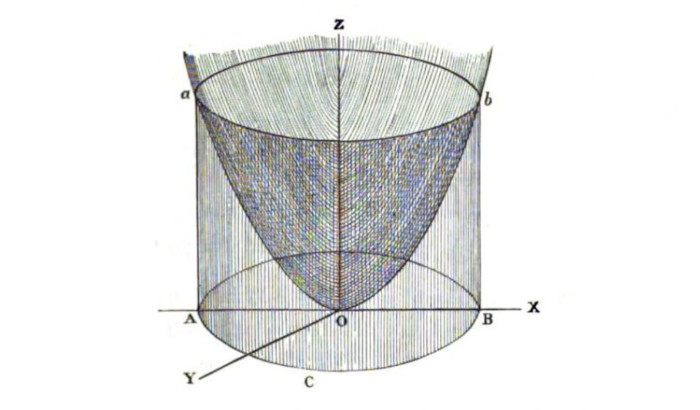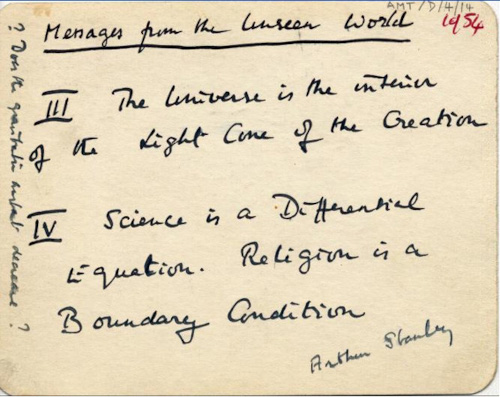Alan Turing? Arthur Eddington? Andrew Hodges? Robin Gandy? John D. Barrow? Dermot Turing? Apocryphal?

Question for Quote Investigator: Apparently, the pioneering computer scientist Alan Turing once compared scientific knowledge to a differential equation and suggested that religion specified a boundary condition for the equation. I have not seen a precise citation. Would you please explore this topic?
Reply from Quote Investigator: In 1983 British mathematician Andrew Hodges published a biography titled “Alan Turing: The Enigma”. Hodges stated that in March 1954 Alan Turing sent four postcards to his friend and colleague Robin Gandy. The second postcard (partially shown below) contained the following lines. Boldface added to excerpts by QI:1
Messages from the Unseen World
III. The Universe is the interior of the Light Cone of the Creation
IV. Science is a Differential Equation. Religion is a Boundary Condition.
Arthur Stanley
The postcard also contained the following line written sideways in the left margin:
? Does the gravitation constant decrease ?

Turing’s message presented a playful interpretation of contemporary cosmological theories. The line “Arthur Stanley” referred to English astronomer Arthur Stanley Eddington, and the beginning line perhaps alluded to Eddington’s 1929 book “Science and the Unseen World”. Gandy stated that he and Turing had been discussing Eddington’s book titled “Fundamental Theory”.2
QI conjectures that Turing’s statement was an analogy. A differential equation may have many possible solutions. A boundary condition is an extra constraint that reduces the number of possible solutions and sometimes specifies a unique solution. The postcard statement suggested that there were many possible universes that were compatible with the latest scientific knowledge. Religious beliefs provided additional assumptions that further constrained the set of possible universes.
Below are additional selected citations in chronological order.
In 1991 English cosmologist John D. Barrow published “Theories of Everything: The Quest for Ultimate Explanation”, and the third chapter used the following as an epigraph:3
Science is a differential equation. Religion is a boundary condition. — Alan Turing
In 2002 “The Penguin Dictionary of Epigrams” compiled by M. J. Cohen contained the following quotation, attribution, and source note:4
Science is a differential equation. Religion is a boundary condition.
Alan Turing epigraph to John D. Barrow, Theories of Everything
In 2006 the biography “The Man Who Knew Too Much: Alan Turing and the Invention of the Computer” by David Leavitt also reprinted the quotation and stated that Turing wrote it on a postcard he sent to Robin Gandy.5
In 2015 Alan Turing’s nephew Dermot Turing published a biography titled “Prof: Alan Turing Decoded”, and he also reprinted the quotation.6
In conclusion, Alan Turing deserves credit for this quotation. He wrote it on a postcard in March 1954 which he sent to colleague Robin Gandy. Sadly, Turing died a few months later in June 1954.
Image Note: A public domain mathematical figure from the 1877 book “A Treatise on Some New Geometrical Methods” by James Booth.
Acknowledgement: Great thanks to Peter Vilters whose inquiry led QI to formulate this question and perform this exploration.
- 1984 (1983 Copyright), Alan Turing: The Enigma by Andrew Hodges, Chapter 8: On the Beach, Time Period: To 7 June 1954, Quote Page 512 to 514, A Touchstone Book: Simon & Schuster, New York. (Verified with scans) ↩︎
- Website: The Turing Digital Archive, Images scanned from the collection of Turing papers held in the Archive Centre at King’s College, Cambridge, Website description: Website contains nearly 3,000 images of letters, photographs, newspaper articles, and unpublished papers by or about Alan Turing. (Accessed turingarchive.kings.cam.ac.uk on January 5, 2023) link ↩︎
- 1992 (1991 Copyright), Theories of Everything: The Quest for Ultimate Explanation by John D. Barrow, Chapter 3: Initial Conditions, Quote Page 42, A Fawcett Columbine Book: Ballantine Books, New York. (Verified with scans) ↩︎
- 2002 (2001 Copyright), The Penguin Dictionary of Epigrams, Compiled by M. J. Cohen, Topic: Science and Technology, Quote Page 347, Penguin Books, London. (Verified with scans) ↩︎
- 2006, The Man Who Knew Too Much: Alan Turing and the Invention of the Computer by David Leavitt, Series: Great Discoveries, Chapter 8: Pryce’s Buoy, Quote Page 278, Atlas Books: W. W. Norton Company, New York. (Verified with scans) ↩︎
- 2015, Prof: Alan Turing Decoded by Dermot Turing, Chapter 11: Unseen Worlds, Quote Page 282, The History Press, Stroud, Gloucestershire U.K. (Verified with scans) ↩︎